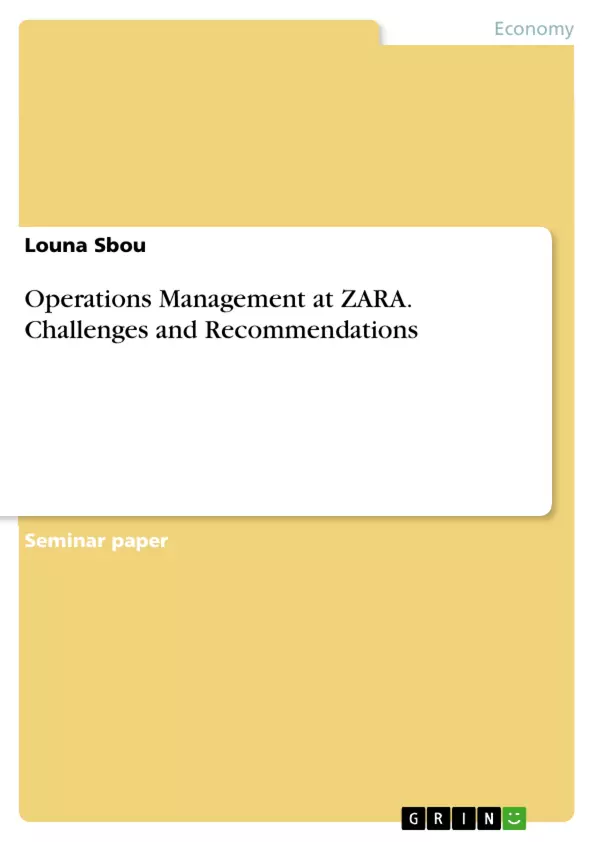The present essay deals with the operations management of ZARA, a Spanish chain store. Also, it will be shown how the ideas of operations management are put into action at ZARA. Finally, the recommendation and conclusion summarizes the results of the essay and offer suggestions for improvement.
Inhaltsverzeichnis (Table of Contents)
- 1. Introduction
- 2. Operations Management
- 2.1. Definition of Operations Management
- 2.2. Meaning of Operations Management
- 3. About ZARA
- 4. ZARA Vertical Integrated Supply Chain
- 4.1. Design and Production
- 4.2. Procurement
- 4.3. ZARA's Vertically Integrated Supply Chain
- 4.4. Inventory Management
- 4.5. Low marketing/ advertising cost
- 4.6. Low marketing/ advertising cost
- 5. Combination of Strategy and Operations
- 6. Financial performance indicators
- 7. ZARA Challenges
- 8. Recommendations
Zielsetzung und Themenschwerpunkte (Objectives and Key Themes)
This essay aims to analyze ZARA's operations management, demonstrating how operational management principles are implemented within the company. It will also offer recommendations for improvement.
- ZARA's vertically integrated supply chain
- The role of operations management in ZARA's success
- ZARA's fast fashion strategy
- Inventory management and cost control at ZARA
- ZARA's marketing and advertising strategy
Zusammenfassung der Kapitel (Chapter Summaries)
1. Introduction: This introductory chapter sets the stage for the essay, outlining its purpose which is to examine ZARA's operations management and its impact on the company's success. It establishes the scope of the analysis and briefly hints at the overall conclusions that will be drawn.
2. Operations Management: This chapter provides a foundational understanding of operations management, defining the concept and explaining its significance in organizational success. It uses examples to illustrate the transformation process involved in operations and highlights the key functionalities: creation, design, production control, and continuous improvement.
3. About ZARA: This chapter presents background information on ZARA, its parent company Inditex SA, and its founder Amancio Ortega Gaona, highlighting its remarkable growth and global presence in the fashion retail industry. It establishes ZARA's position as a major player in the market and sets the context for the subsequent analysis of its operational strategies. The chapter showcases ZARA's exceptional performance record in recent years.
4. ZARA Vertical Integrated Supply Chain: This chapter delves into the intricacies of ZARA's vertically integrated supply chain, exploring its key components including design and production, procurement, information systems, inventory management, centralized logistics and distribution, and low marketing/advertising costs. It analyses how these elements contribute to ZARA's ability to produce high-quality products at competitive prices, highlighting its unique approach compared to competitors such as H&M and Benetton. The chapter emphasizes the importance of timely schedules, supplier information, and efficient material management.
5. Combination of Strategy and Operations: This chapter examines the strategic alignment between ZARA's operations and its overall business strategy. It discusses ZARA's "fast fashion" approach, highlighting its ability to rapidly bring new designs to market and its practice of replicating competitor designs. This section links the operational efficiency to the broader strategic goals of growth and market dominance.
Schlüsselwörter (Keywords)
Operations management, ZARA, supply chain management, fast fashion, vertical integration, inventory management, cost control, marketing strategy, competitive advantage.
ZARA's Operations Management: FAQ
What is the purpose of this document?
This document provides a comprehensive preview of an essay analyzing ZARA's operations management. It includes the table of contents, objectives and key themes, chapter summaries, and keywords.
What are the main topics covered in the essay?
The essay examines ZARA's operations management, focusing on its vertically integrated supply chain, the role of operations management in its success, its fast fashion strategy, inventory management and cost control, and its marketing and advertising strategy.
What is discussed in the "Operations Management" chapter?
This chapter defines operations management, explains its significance, and illustrates the transformation process involved in operations, highlighting key functionalities such as creation, design, production control, and continuous improvement.
What information is provided about ZARA in the essay?
The essay provides background information on ZARA, its parent company Inditex SA, its founder, its growth, global presence, and its exceptional performance record. It establishes ZARA's position as a major player in the fashion retail industry.
How does the essay analyze ZARA's supply chain?
The essay delves into the details of ZARA's vertically integrated supply chain, examining its design and production, procurement, information systems, inventory management, centralized logistics and distribution, and low marketing/advertising costs. It compares ZARA's approach to competitors like H&M and Benetton.
What is the significance of ZARA's fast fashion strategy?
The essay analyzes ZARA's "fast fashion" approach, its ability to rapidly bring new designs to market, and its practice of replicating competitor designs. It links operational efficiency to strategic goals of growth and market dominance.
What are the key takeaways from the chapter on the combination of strategy and operations?
This chapter highlights the strategic alignment between ZARA's operations and its overall business strategy. It demonstrates how operational efficiency directly contributes to ZARA's strategic goals of growth and market dominance.
What challenges facing ZARA are addressed?
While the provided text doesn't detail specific challenges, the essay's inclusion of a "ZARA Challenges" chapter suggests that the full essay will address potential difficulties faced by the company.
What recommendations are offered in the essay?
The preview indicates that the essay includes a chapter dedicated to recommendations for improving ZARA's operations, although specific recommendations are not detailed in this preview.
What are the keywords associated with the essay?
The keywords are: Operations management, ZARA, supply chain management, fast fashion, vertical integration, inventory management, cost control, marketing strategy, competitive advantage.
- Citar trabajo
- Louna Sbou (Autor), 2011, Operations Management at ZARA. Challenges and Recommendations, Múnich, GRIN Verlag, https://www.grin.com/document/316105



